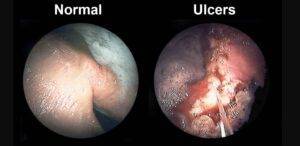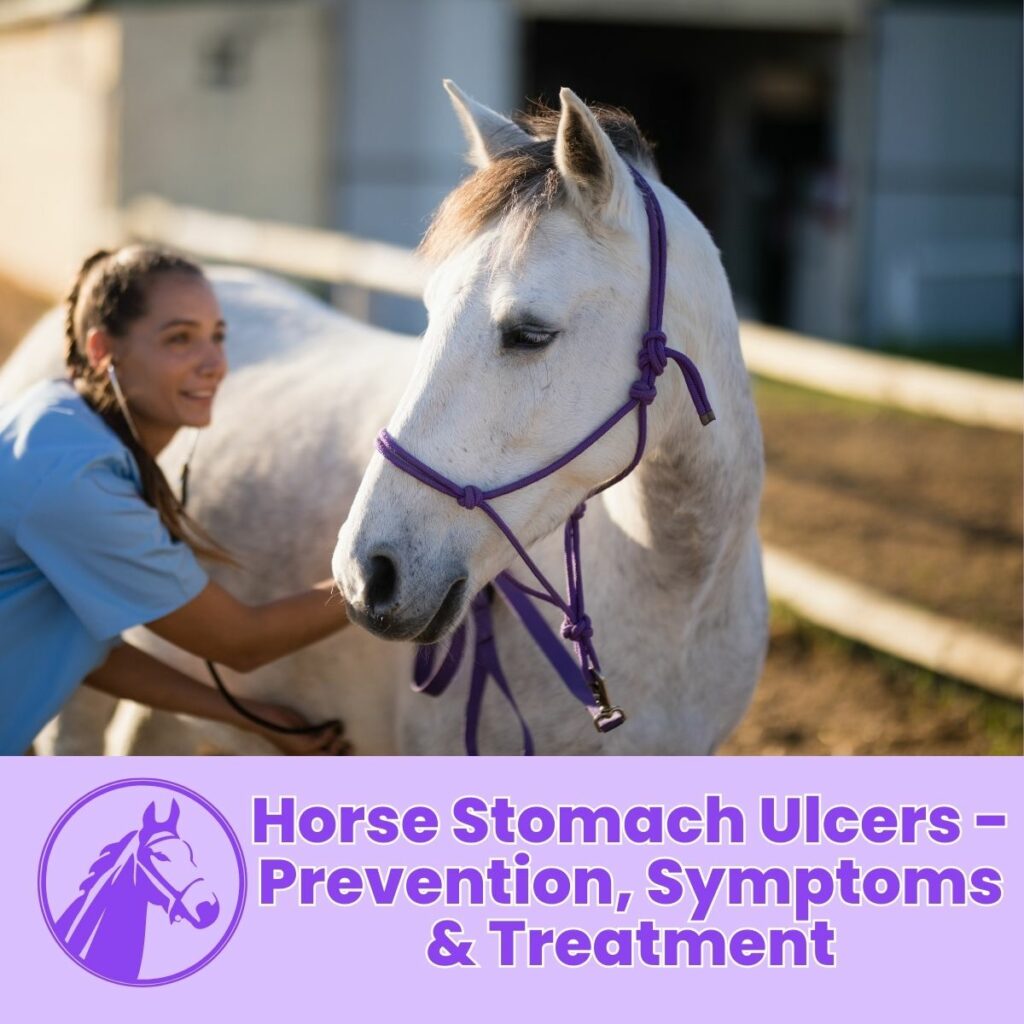As an Amazon Associate we earn from qualifying purchases.
Horse stomach ulcers are a common and often overlooked health issue affecting equines of all ages and disciplines. These painful sores can significantly impact a horse’s overall well-being and performance. In this article, we will delve into the causes, symptoms, prevention, and treatment options for horse stomach ulcers.
What Are Horse Stomach Ulcers?
Horse stomach ulcers, also known as Equine Gastric Ulcer Syndrome (EGUS), refer to the formation of erosions or ulcers in the lining of a horse’s stomach. These ulcers can occur in various regions of the stomach, including the squamous and glandular portions. They are primarily caused by an excessive accumulation of stomach acid, leading to irritation and erosion of the delicate gastric lining.

Common Causes of Horse Stomach Ulcers
Several factors contribute to the development of stomach ulcers in horses. These include:
- Prolonged periods without food intake
- High-grain diets
- Limited access to forage
- Intensive exercise or training routines
- Stressful environments (e.g., travel, competition, social isolation)
- Use of nonsteroidal anti-inflammatory drugs (NSAIDs)
Recognizing the Symptoms
Identifying the symptoms of horse stomach ulcers can be challenging, as they often manifest differently in each horse. However, some common signs to watch out for include:
- Decreased appetite or reluctance to eat
- Weight loss or poor body condition
- Changes in behavior, such as increased irritability or depression
- Dull coat or poor coat condition
- Mild colic-like symptoms, such as intermittent discomfort or recurrent episodes of lying down
SEE ALSO : Everything You Need to Know About the Coggins Test in Horses
GastroMend Ulcer Supplement for Horses
GastroMend™ Ulcer Supplement for Horses has been formulated to protect of the stomach of horses from ulcers and to help heal any existing ulcers. It is a well-known supplement that is used to aid with gastric ulcer prevention and treatment in horses.
GastroMend is composed of several key ingredients that aid in protecting and healing the horse’s stomach lining. Primarily, GastroMend uses a unique combination of hyaluronic acid ester, natural mucin binders, and buffered sodium bicarbonate to provide a coating that seals and protects the stomach lining. These molecules adhere to the walls of the stomach to form a protective barrier against acid, promoting safety and providing protection from stomach ulcers. The combination of these molecules helps to decrease clinical signs of gastric distress such as anorexia, colic, anddiarrhea.
The supplement itself is designed to be fed to horses with two tablespoons once a day. For horses with existing ulcers, the recommended dose is four tablespoons per day for the first 10 days to help treat and heal any existing ulcers. Additionally, GastroMend may be included in daily feedings of horses prone to ulcer formation as a preventative measure. In order to get the most out of this supplement, it is important to pair it with a regular feed, forage, and exercise routine that minimizes stress that can cause the development of ulcers.
Overall, GastroMend Ulcer Supplement for Horses can be a great tool in preventing and healing stomach ulcers in horses. The unique combination of hyaluronic acid ester, natural mucin binders, and buffered sodium bicarbonate can work together to form a protective barrier against acid to promote overall stomach safety. Additionally, it can be used as a preventative measure and for the treatment of existing ulcers with proper dosage and feed regimens.
Preventive Measures for Horse Stomach Ulcers
To reduce the risk of stomach ulcers in horses, it’s essential to implement certain preventive measures, such as:
- Providing a consistent and balanced diet, including adequate forage
- Ensuring access to clean water at all times
- Managing exercise routines and workload effectively
- Reducing stress levels by maintaining a calm and harmonious environment
- Considering the use of gastric supplements or medications under veterinary guidance
Treating Horse Stomach Ulcers
Treating horse stomach ulcers involves a multifaceted approach that aims to alleviate symptoms and promote healing. Veterinary intervention is crucial in determining the appropriate treatment plan. Common treatment strategies include:
- Medications to reduce stomach acid production (proton pump inhibitors)
- Medications to protect and soothe the stomach lining (coating agents)
- Dietary modifications, including increasing forage intake and reducing grain concentration
- Management changes to reduce stress levels and allow for ample turnout time
For more information on treating horse stomach ulcers follow this link.
Horse Stomach Ulcers – Final Thoughts
Horse stomach ulcers are a prevalent health concern in equines, impacting their overall health and performance. By understanding the causes, recognizing the symptoms, and implementing preventive measures, horse owners and caretakers can significantly reduce the risk of ulcers. Timely veterinary intervention, along with a comprehensive treatment plan, can alleviate symptoms and promote healing. By prioritizing the well-being of our horses and addressing stomach ulcers proactively, we can ensure their optimal health and longevity.
Remember, if you suspect that your horse may have stomach ulcers or any other health condition, consult with a veterinarian for an accurate diagnosis and tailored treatment plan. Your horse’s well-being is of utmost importance, and proactive care is key to their overall health and happiness.
Amazon and the Amazon logo are trademarks of Amazon.com, Inc, or its affiliates.

Hey there, I’m Jasmine! I’m a total horse fanatic and have been working with these amazing animals for as long as I can remember. I’m passionate about sharing my love for horses with others and helping them learn more about these majestic creatures. As a professional horse trainer and riding instructor, I’ve developed a deep understanding of equine science and am committed to the welfare of horses. That’s why I founded OwnTheHorse.com, a blog where I share my knowledge and insights with fellow horse enthusiasts. I love connecting with my readers and building a friendly community of horse lovers. Whether you’re a seasoned equestrian or just starting out, I’m here to help and inspire you. Above all, I’m a friendly and compassionate person who truly cares about the well-being of horses and their human companions.

